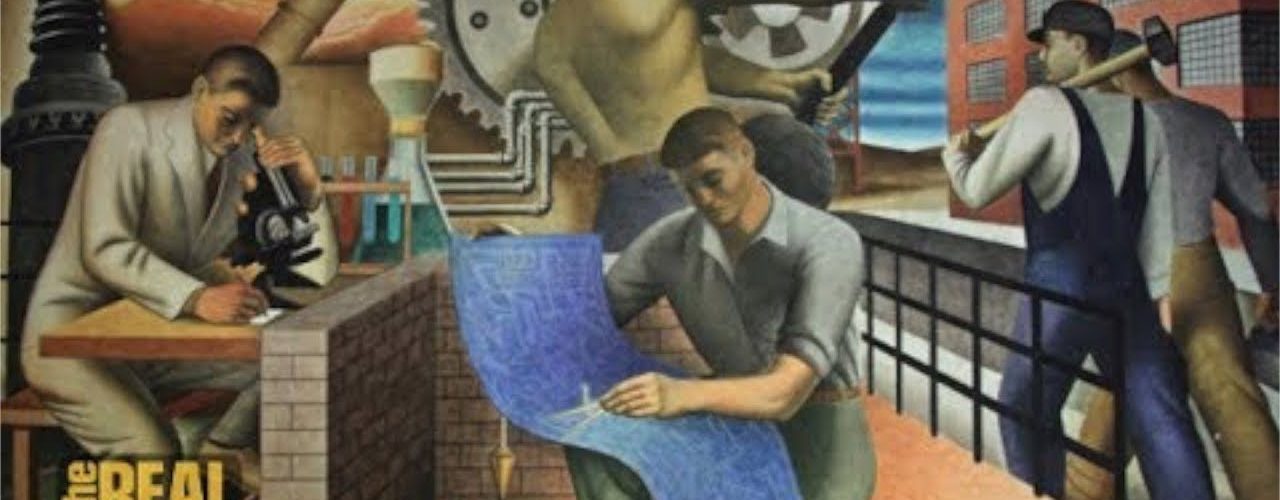Imperialism is about the struggle to control economic territories such as markets, workers and natural resources says economist, Jayati Ghosh who explains imperialism has gone through many different forms of control in the course of its evolution yet whether explicit or implicit. In a 3 part discussion, Ghosh unpacks the shift in imperialism into the present from explicit power relations under colonialism to 21st century forms of imperialism under implicit rules and regulations determined by an international legal and institutional architecture.
June 27, 2017 Produced by Lynn Fries
TRANSCRIPT
Lynn Fries: This is the Real News Network, I’m Lynn Fries in Geneva. At the heart of capitalism in the 21st century, the dynamics of imperialism remain fundamentally unchanged since the era of colonialism and the post-war Bretton Woods era. What has changed in the 21st century is the form of how imperialism is expressed and enforced in the neoliberal era.
This is the topic of conversation with our guest, Jayati Ghosh. Specifically, the international legal and institutional architecture of imperialism in the 21st century. A professor of economics at Jawaharlal Nehru University, Jayati Ghosh is based in India, New Delhi and is here in Geneva for a visit. Welcome, Jayati.
Jayati Ghosh: Thank you, it’s a pleasure to be here.
Lynn Fries: In a recent essay you explain the profound impact of Prabhat Patnaik in advancing research and understanding of imperialism among economists, yourself included. Tell us some of your thoughts on that.
Jayati Ghosh: You know, I think one of the great achievements of Prabhat Patnaik, who was my teacher and then my colleague and my mentor, is that he kind of brought the notion of imperialism to life in contemporary economic realities. And in particular, I think he highlighted the insight of Lenin that imperialism is fundamentally about the struggle over economic territory. It’s not just about state control or colonial control or any specific kind of control. It’s really the struggle of large capital over different kinds of economic territory. And these could be territories defined in terms of markets, in terms of workers and labor, in terms of natural resources, in terms of new kinds of markets that are developed.
Lynn Fries: Talk about the evolution of imperialism and its continued relevance.
Jayati Ghosh: Well, you know, imperialism has gone through many different forms in the course of its evolution. There was the time when it was explicit colonial control, when it was the control by the state over other physical territories which they could then change to their own desires. Subsequently, in the post-war world in the second half of the 20th century, you had a different form of imperialism where it was expressed much more in terms of the fact that there was a major super power. If you like, the head of the free world who was able to impose the rules in terms of determining how transactions occurred, determining the power of capital in different ways.
Now, really what’s happened in the last decade of the 20th century and now subsequently in the 21st century is that that complete domination of one imperial power in terms of the capitalist world, that is no longer evident. It’s a much more open kind of free-for-all. You’re getting what Lenin would have a century ago called “inter-imperialist rivalries” coming to the fore much more. But you’re also getting the emergence of new powers who will question some of those rules and where the old static rules of the game don’t work anymore.
And therefore imperialism has had to move towards new ways of control. They are not purely military. They are not purely political. They are much more, I would call them, legal and institutional forms of control. And these operate through creating rules for the limits of government to control capital in different ways. What we see as international agreements, if you break them down carefully, they are all about controlling government’s ability to control capital. Whether it is in the area of trade, controlling government’s abilities to control trade, or it is in the area of investment, limiting government’s abilities to regulate investment both cross border and inside their own economies, or it is financial flows. So, the WTO, of course, several of the rules of the IMF, but much more significantly, the new trade and investment treaties that are being signed, plurilateral, bilateral, all of these mega regionals. All of these are really oriented towards limiting the power of nation states to control capital, which in turn means that imperialism is able to take new forms.
Lynn Fries: Give us some background on earlier forms of imperialism.
Jayati Ghosh: About a century ago we saw a period when the earlier order, where you had a much more stable kind of control of capital in a stable imperialist form, was disintegrating. So we had a breakdown of the kinds of arrangements that enabled that stable kind of control. And we had a period, the interwar period, of course, of tremendous instability across the major capitalist powers and the emergence of all kinds of very unpleasant forces, fascist forces, but also the emergence of very strong workers’ movements across the advanced economies and, of course, the fact that you had a Russian revolution. You had the emergence of major alternative powers, socialist governments in different countries. And you had a much more restive and angry working class that was sick and tired of inequality and willing to actually demand more of its rights.
Of course, the culmination in the Second World War of all of these contradictions meant that the post-world war situation had to be different. And you had, I believe, what is called a kind of, you know, the global arrangements of the Bretton Woods. That was a global contract between the developed and developing countries which allowed some degree of stability and also some possibilities for national development strategies that were autonomous in the developing world. But you also had within the advanced countries, the recognition that workers had to be given greater security and a greater piece of the economic pie. So you had the welfare state. You had Beveridge and others coming in, in England and elsewhere, talking about the need to ensure workers’ rights, basic social protections, a whole range of public provision in education, in health and a number of other areas.
You had the change in the social contract, I would say, between capital and labor because, in a sense, capital was really on its knees. There was so much social unrest. There was so much anger at the way in which capital had really messed up the global economy and created conflict and what turns out to be hugely expensive and ultimately unnecessary wars that, in a way, capital had to make concessions to labor. What we saw, in what was then called the Golden Age, you know, the Bretton Woods period of stability, etcetera, is capital making these concessions to labor under the aegis of democratic states that regulated the powers of how capital behaved. But also provided much more to working classes in terms of what we now see as the social and economic rights of the working classes.
In the developing world, things were of course different, and they varied from region to region. But it was very much the case that, in the developing world, there was the ability for autonomous economic development. Of course, the Cold War helped, there’s no question about it. The fact that there was a large socialist block that was sufficiently powerful not only created a nonaligned movement that saw itself as equidistant between two systems but it also created a tremendous bargaining power among developing countries which enabled them to actually pursue autonomous development trajectories. And it’s these trajectories that, in a sense, come to roost in the latter part of the 20th century, where Japan, for example, certainly emerges as a very major capitalist power. But even the east Asian development successes, even the industrialization that we saw in a number of Latin American countries, the emergent industrialization, which is now stalled in countries like India, and so on, we saw all of that happen because of, if you like, that global contract which had also emerged from the post-world war consensus.
Lynn Fries: Explain more about this social contract where under the aegis of democracy capital made concessions to labor.
Jayati Ghosh: Well, I think it would be a basic error to look at capital in terms of whether it is fundamentally benevolent or well-inclined and so on. There’s nothing emotional or sentimental about how capital operates. The purpose of capital is to make profits. That is its law. That is why it operates. And, objectively, whatever will deliver it more profits is what it will do. And that has nothing to do with, if you like, how bloody minded or benevolent capitalists are. It’s a separate thing. Those who wish to be particularly benevolent etcetera will fall by the wayside in the competition between capitalists. So, capital in its logic is designed to actually generate more and more profits. The political system, the social and political system is what has to rein it in. And in the period that we had talked about, the post-world war period, it was the political and social system that reined in capital and forced it to operate slightly more in the interests of society as a whole.
Now, what happened with, first of all the breakdown of the ’70s and then the ’80s and the re-emergence of what we today call neoliberalism, is that the social contract that had sort of bound all of this together, that dissolved. Because it appeared that it was no longer able to deliver. There was, first of all, the stagflation of the ’70s in the developed world and a period of chaos in the developing world. And then, the fact that, you know, that welfare state thing was, in a sense, creaky. It was not able to deliver in a seamless and sustainable way. And that, I believe, created the political confusion under which neoliberalism emerges.
I think neoliberalism is, in a sense, a distinct phase of capitalism. Many have linked it to financial globalization. That’s certainly an important element of neoliberalism but it’s more than that. Neoliberalism is fundamentally the view that the role of the state is not necessarily to reduce its power but to exercise its power directly in favor of capital. And that is based on a logic that economic growth is what matters. Economic growth will deliver all the other stuff, whether it is better living conditions or democracy or equity or anything. To get economic growth, you have to rely on large capital because they are the ones who can give you modern, formal sector employment and so on. To encourage large capital to invest and therefore cause economies to grow you have to give them incentives. And therefore, you have to give them fiscal incentives. Y ou have to give them monetary incentives. You have to give them freedom to operate as they see fit. You have to stop regulating them in different ways.
This logic is what underlies neoliberalism. People talk about it as a retreat of the state. It’s not a retreat of the state. It’s a shift of the state away from protecting the interests of society at large and particularly, therefore, the working class towards protecting the interests of capital. Because we will see that states are no less powerful. In fact, some of the most neoliberal states are often the most authoritarian. And they’re becoming more and more authoritarian. But they are not promoting the interests of citizens, in general. And often they don’t even see themselves as fundamentally accountable to citizens. They see themselves or rather, the underlying motivation is to protect the interests of capital. Once again, it’s not necessarily bloody mindedness on the part of those who rule the states. It is based on this underlying logic that I mentioned that, you know, it’s only large capital that can deliver the goods in terms of economic growth and progress and all of that.
Now, when this happened, you also got…In terms of large capital, there’s a problem. And this problem is, in a way, at the heart of contemporary imperialism. And we could go back to the old prey-predator arguments that, you know, operate in biology and so on, which is that predators need a certain population of prey. And they need that prey to survive and fatten up actually, and be all right, to some extent. Because otherwise you eat too much of the prey, you starve yourself. And, in a way, this is what capitalism has done. The much greater power given to large capital under this new international regime has actually created a situation where they’re not generating the markets they need. Because you keep pushing down the share of wages in national income, you keep suppressing wages in your societies, you have a problem of demand. You have a problem of actually finding markets for your products. You can do it for a while by exporting the problem. And some countries continue to do it, Germany, for example. But in fact that still doesn’t meet your requirements of continuous growth.
So increasingly, finance capitalism sought to solve that problem through generating credit booms. So you have a boom, it ultimately ends in a bust because it is based on a credit bubble that cannot be sustained. But then, alright, you have the bust and then everybody gets up, picks up the pieces, and you have another credit boom. We’ve seen this in two successive decades, in the 1990s, again in the 2000s. That too runs out of steam. You can’t keep generating these same credit booms, because as households and companies get over-leveraged they’re not going to keep spending more. And the more you keep generating this income polarization between the workers and the peasants of the developing world and everyone and large capital, the more you come up against this demand constraint. So, in a way, that classic prey-predator relationship is playing out in global capitalism today, and that’s what gets expressed in these terms like “the new normal”, “secular stagnation”, you know, all of these terms that are thrown around that we just have to live with this because this is just the way things are now.
Lynn Fries: We are going to break and be back with our guest, Jayati Ghosh, in Part 2 of this conversation on Imperialism in the 21st Century. Jayati Ghosh, thank you.
Jayati Ghosh: Thank you.
Lynn Fries: And thank you for joining us on The Real News Network.
END TRANSCRIPT
Jayati Ghosh is Professor of Economics at Jawaharlal Nehru University in New Delhi, Executive Secretary of International Development Economics Associates and the co-recipient of the International Labour Organisation’s 2010 Decent Work Research prize.
Originally published at TRNN



